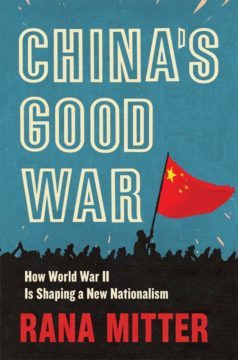Yangyang Cheng in the Los Angeles Review of Books:
 As a young child, I did not put much thought into who had led the Chinese against Japan. Once, at home, I had heard my father make a casual comment that the War of Resistance, as World War II is known in China, was mostly fought by the Nationalists. When I repeated the statement over dinner, my mother stared at her husband as if he were one of her disobedient students. After a long, awkward silence, she turned to look at me and said, “the Nationalists and the Communists cooperated,” before telling everyone at the table to never speak of this again.
As a young child, I did not put much thought into who had led the Chinese against Japan. Once, at home, I had heard my father make a casual comment that the War of Resistance, as World War II is known in China, was mostly fought by the Nationalists. When I repeated the statement over dinner, my mother stared at her husband as if he were one of her disobedient students. After a long, awkward silence, she turned to look at me and said, “the Nationalists and the Communists cooperated,” before telling everyone at the table to never speak of this again.
For Chinese people of my parents’ generation, their youth was marred by years of extreme political fervor, during which expression of sympathy for the Nationalists was deemed treasonous. The Bloody Battle of Taierzhuang, released in 1986 to wide acclaim, marked an important transition in the public memory of the war. Since then, instead of allowing only Communist heroes, the official account in recent years has depicted the Nationalists in a more positive light. This shifting narrative, as well as the political calculations behind the reassessment, is the focus of China’s Good War: How World War II Is Shaping a New Nationalism, a new book by Rana Mitter, a professor of modern Chinese history and politics at Oxford whose previous publications include Forgotten Ally: China’s World War II, 1937–1945.
More here.
